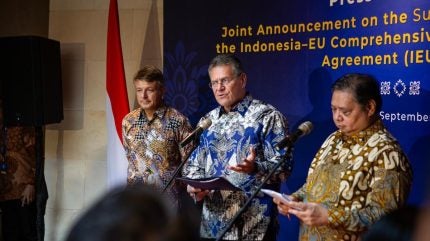
The EU and Indonesia have concluded talks on a free-trade deal that includes zero tariffs on palm oil exports from the South East Asian country.
The draft agreement, described by EU Trade Commissioner Maroš Šefčovič as “a game-changer for both our economies”, removes Indonesia’s duties on certain EU agri-food products.

Discover B2B Marketing That Performs
Combine business intelligence and editorial excellence to reach engaged professionals across 36 leading media platforms.
EU farming lobby groups Copa and Cogeca welcomed the deal, which will head to the European Council and European Parliament for approval.
However, the zero-tariff rate on Indonesian palm oil has attracted criticism in campaign circles.
Under the agreement, palm oil from Indonesia will face zero tariffs within a defined quota. EU tariffs on all palm oil imports range up to 12.8%. Much of Indonesia’s palm oil shipments to the EU already face a 0% tariff, Just Food understands.
The EU said the so-called Comprehensive Economic Partnership Agreement, announced yesterday (23 September), includes a “protocol” on palm oil, “geared towards maximising the potential of CEPA to support trade in sustainable palm oil”.

US Tariffs are shifting - will you react or anticipate?
Don’t let policy changes catch you off guard. Stay proactive with real-time data and expert analysis.
By GlobalDataIn a statement, the EU said: “It does so by establishing a platform for dialogue, including on regulatory developments of relevance for the palm oil sector, and creating a framework to work more closely together in areas of specific importance for the sustainability of palm oil production.”
Reacting to the news of the agreement, Eddy Martono, chairman of the Indonesian Palm Oil Association (GAPKI), said the deal was “good news” but he expressed concern about the EU’s planned deforestation regulations, or EUDR.
“The IEU-CEPA is good news but if the EUDR cannot be fulfilled, then zero tariffs are useless. Our exports will still be hampered,” Martono said in a statement.
In a separate announcement yesterday, the European Commission, the EU’s executive arm, said it would propose another delay to EUDR coming into force.
The regulations were set be implemented in December after already being pushed back.
Under EUDR, companies marketing products including cocoa, coffee and palm oil, as well as foods that contain the ingredients, in the EU will have to demonstrate their supply chains are free from deforestation-related impacts.
EUDR, first announced in 2021, was originally due to be enforced on 30 December this year but the Commission faced pressure from parts of the food industry to extend the deadline. Brussels agreed to a one-year delay last December.
IT problems have now led the Commission to put forward plans for another postponement of one year.
Fern, an NGO working to protect forests and the rights of forest peoples, hit out at the deal between the EU and Indonesia and the prospect of another delay to EUDR.
“The deal reinforces an extractive model which has already caused immense harm to Indonesia’s forests,” Fern campaigner Perrine Fournier said. “It contains no tangible, foreseen benefits for those who have historically lost out when trade is liberalised – namely, indigenous communities, smallholders and workers. Instead, it strengthens the already vice-like grip corporations hold over Indonesia’s forests.”
Fellow Fern campaigner Nicole Polsterer added: “Regardless of any IT faults, over the past 12 months, we’ve witnessed a relentless attempt to derail the EUDR. This is part of a wider battle: between those who want to protect the natural world and the life systems which depend on it, and those intent on destroying it, often driven by narrow self-interest.”
In July, Cadbury owner Mondelez International had called for a further delay to the rules, arguing the rules had to be “workable” in practice.
However, a letter co-signed by rival chocolate makers Nestlé and Ferrero urged the Commission to ensure “the full preservation and swift, ambitious implementation” of EUDR.
The EU exports primarily dairy and other animal products to Indonesia. Brussels said EU agri-food exports to Indonesia were worth €1bn ($1.18bn) in 2024. Indonesia’s main agricultural exports to the EU are palm oil, cocoa and coffee.
Farm Europe, a network of farming organisations in the region, including French farming federation FNSEA and Italian farming body Coldiretti, said the potential export opportunities in Indonesia are “rather limited”.
“The main expected impact is on Indonesian palm oil exports that will benefit from a tariff-free TRQ [tariff-rate quota] and a 3% tariff out of quota. That is the main Indonesian agriculture export. Regarding European potential export opportunities, the expected impact is rather limited. Indonesia imports mainly soybeans, beef, dairy, wheat, and rice to cover for domestic shortfalls,” Farm Europe said in a statement.
“The EU will face strong competition on beef from Brazil, Australia and the US. On dairy, from New Zealand. On wheat from Russia, US. The EU doesn’t export soybeans, and, on rice, it can’t compete against South East Asia.”





